Items filtered by date: May 2022
Ankle Sprains, Strains, and Breaks
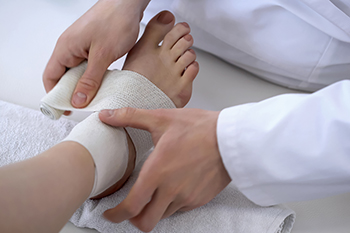
Injuries to your ankle such as sprains, strains, and breaks may feel similar, but are different. Sprains occur when there is an unnatural stretch or tear in the ligament(s) that support and bind the ankle. There may be an audible pop when you sprain your ankle, and there will be varying degrees of pain, bruising, swelling, and inflammation, and even a deformity, depending on the severity of the sprain. It may be difficult or even impossible to walk on the affected foot. Strains occur when tendons or muscles around the ankle are stretched or pulled repetitively or excessively. The symptoms of an ankle strain are similar, and may also include cramping and muscle spasms. Breaks are chips, fractures, or complete breaks in one or more of the bones in your ankle. Walking on a broken ankle may be impossible. Regardless of which injury has occurred, it is suggested that you see a podiatrist right away to be properly diagnosed and treated.
Ankle pain can have many different causes and the pain may potentially be serious. If you have ankle pain, consult with Dr. Douglas Mckay from New Jersey . Our doctor will assess your condition and provide you with quality foot and ankle treatment.
Ankle pain is any condition that causes pain in the ankle. Due to the fact that the ankle consists of tendons, muscles, bones, and ligaments, ankle pain can come from a number of different conditions.
Causes
The most common causes of ankle pain include:
- Types of arthritis (rheumatoid, osteoarthritis, and gout)
- Ankle sprains
- Broken ankles
- Achilles tendinitis
- Achilles tendon rupture
- Stress fractures
- Tarsal tunnel syndrome
- Plantar fasciitis
Symptoms
Symptoms of ankle injury vary based upon the condition. Pain may include general pain and discomfort, swelling, aching, redness, bruising, burning or stabbing sensations, and/or loss of sensation.
Diagnosis
Due to the wide variety of potential causes of ankle pain, podiatrists will utilize a number of different methods to properly diagnose ankle pain. This can include asking for personal and family medical histories and of any recent injuries. Further diagnosis may include sensation tests, a physical examination, and potentially x-rays or other imaging tests.
Treatment
Just as the range of causes varies widely, so do treatments. Some more common treatments are rest, ice packs, keeping pressure off the foot, orthotics and braces, medication for inflammation and pain, and surgery.
If you have any questions, please feel free to contact one of our offices located in Caldwell, and Galloway, NJ . We offer the newest diagnostic and treatment technologies for all your foot care needs.
Pregnancy and Problems with the Feet and Ankles
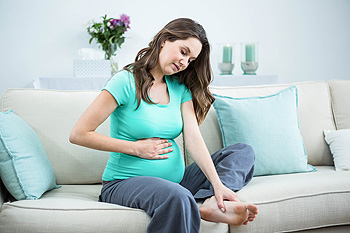
A woman’s body goes through many changes while they are pregnant, and the feet and ankles are often negatively affected. For instance, drastic hormonal changes and weight gain, and an increased amount of bodily fluids can cause uncomfortable swelling (edema) in the feet and ankles. Edema, as well as cramping and pain in the feet and calves, can also be caused by blood irregularities during pregnancy. Fallen arches and a widening of the feet are often due to ligaments loosening as the body prepares for childbirth. Many of these conditions associated with pregnancy will subside after childbirth, however, some may linger. If you are experiencing any discomfort or irregularities in your feet or ankles during or after pregnancy, contact a podiatrist.
Pregnant women with swollen feet can be treated with a variety of different methods that are readily available. For more information about other cures for swollen feet during pregnancy, consult with Dr. Douglas Mckay from New Jersey . Our doctor will attend to all of your foot and ankle needs.
What Foot Problems Can Arise During Pregnancy?
One problem that can occur is overpronation, which occurs when the arch of the foot flattens and tends to roll inward. This can cause pain and discomfort in your heels while you’re walking or even just standing up, trying to support your baby.
Another problem is edema, or swelling in the extremities. This often affects the feet during pregnancy but tends to occur in the later stages.
How Can I Keep My Feet Healthy During Pregnancy?
- Wearing orthotics can provide extra support for the feet and help distribute weight evenly
- Minimize the amount of time spent walking barefoot
- Wear shoes with good arch support
- Wear shoes that allow for good circulation to the feet
- Elevate feet if you experience swelling
- Massage your feet
- Get regular, light exercise, such as walking, to promote blood circulation to the feet
If you have any questions please feel free to contact one of our offices located in Caldwell, and Galloway, NJ . We offer the newest diagnostic and treatment technologies for all your foot and ankle needs.
Foot Conditions That May Come From Wearing High Heels
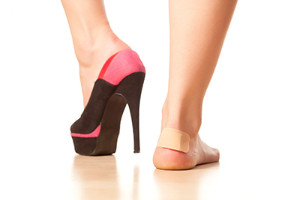
Many people stopped wearing high heels during last year's lockdown. People who have chosen to resume wearing high heels as more social and workplaces open up may be experiencing foot pain. This may be a result of a shortened Achilles tendon and may take time to adjust when high heels are worn again. There are foot conditions that may develop as a result of frequently wearing high heels, including plantar fasciitis, bunions, and hammertoes. Additionally, ailments consisting of Morton’s neuroma and corns may cause pain from wearing high heels. The good news is that high heels can be worn as desired when the heels that are chosen are not higher than an inch and a half. This can give the appearance that is wanted and the feet can be protected at the same time. If you have questions about how high heels can affect the feet, please feel free to confer with a podiatrist who can address any concerns you may have.
High heels have a history of causing foot and ankle problems. If you have any concerns about your feet or ankles, contact Dr. Douglas Mckay from New Jersey . Our doctor can provide the care you need to keep you pain-free and on your feet.
Effects of High Heels on the Feet
High heels are popular shoes among women because of their many styles and societal appeal. Despite this, high heels can still cause many health problems if worn too frequently.
Which Parts of My Body Will Be Affected by High Heels?
- Ankle Joints
- Achilles Tendon – May shorten and stiffen with prolonged wear
- Balls of the Feet
- Knees – Heels cause the knees to bend constantly, creating stress on them
- Back – They decrease the spine’s ability to absorb shock, which may lead to back pain. The vertebrae of the lower back may compress.
What Kinds of Foot Problems Can Develop from Wearing High Heels?
- Corns
- Calluses
- Hammertoe
- Bunions
- Morton’s Neuroma
- Plantar Fasciitis
How Can I Still Wear High Heels and Maintain Foot Health?
If you want to wear high heeled shoes, make sure that you are not wearing them every day, as this will help prevent long term physical problems. Try wearing thicker heels as opposed to stilettos to distribute weight more evenly across the feet. Always make sure you are wearing the proper shoes for the right occasion, such as sneakers for exercising. If you walk to work, try carrying your heels with you and changing into them once you arrive at work. Adding inserts to your heels can help cushion your feet and absorb shock. Full foot inserts or metatarsal pads are available.
If you have any questions please feel free to contact one of our offices located in Caldwell, and Galloway, NJ . We offer the newest diagnostic and treatment technologies for all your foot and ankle needs.
Ways to Prevent Falls in the Elderly
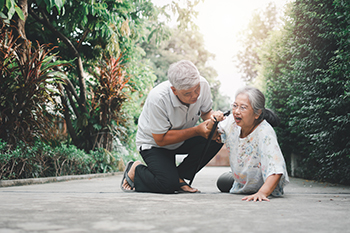
According to the CDC, one out of four seniors over 65 experiences a fall, and the odds are that once you have fallen, it will happen again. This often occurs as the result of diminishing balance, mobility and coordination as you age. Five simple ways to help prevent falls, and the injuries that may follow, include removing tripping hazards around the home, making stairs and bathrooms safer, wearing proper shoes and slippers, using a cane or walker, and doing exercises that both strengthen legs and feet and improve balance and coordination. First, it is suggested that you remove area rugs or mats that can be tripped over or that slide too easily, and clear hallways and walkways of clutter or other objects. Second, have railings installed on all stairways, including those on porches or home entry areas. Also, add grab bars to bathroom tubs and showers and make sure to use non-slip mats. Third, find shoes that provide support and fit well. Avoid going barefoot and walking around in socks at home. Instead get shoes and slippers with non-skid soles for safety both inside and out of the house. Fourth, it is amazing how many seniors refuse to use a walking aid out of vanity, but using a cane or walker is one of the best ways to avoid falls. Finally, see your podiatrist for information on how to strengthen your ankles and feet with exercises you can do at home. A podiatrist can answer any questions you may have on ways to prevent falling.
Preventing falls among the elderly is very important. If you are older and have fallen or fear that you are prone to falling, consult with Dr. Douglas Mckay from New Jersey . Our doctor will assess your condition and provide you with quality advice and care.
Every 11 seconds, an elderly American is being treated in an emergency room for a fall related injury. Falls are the leading cause of head and hip injuries for those 65 and older. Due to decreases in strength, balance, senses, and lack of awareness, elderly persons are very susceptible to falling. Thankfully, there are a number of things older persons can do to prevent falls.
How to Prevent Falls
Some effective methods that older persons can do to prevent falls include:
- Enrolling in strength and balance exercise program to increase balance and strength
- Periodically having your sight and hearing checked
- Discuss any medications you have with a doctor to see if it increases the risk of falling
- Clearing the house of falling hazards and installing devices like grab bars and railings
- Utilizing a walker or cane
- Wearing shoes that provide good support and cushioning
- Talking to family members about falling and increasing awareness
Falling can be a traumatic and embarrassing experience for elderly persons; this can make them less willing to leave the house, and less willing to talk to someone about their fears of falling. Doing such things, however, will increase the likelihood of tripping or losing one’s balance. Knowing the causes of falling and how to prevent them is the best way to mitigate the risk of serious injury.
If you have any questions, please feel free to contact one of our offices located in Caldwell, and Galloway, NJ . We offer the newest diagnostic and treatment technologies for all your foot care needs.
The Elderly Population May Have Foot Conditions
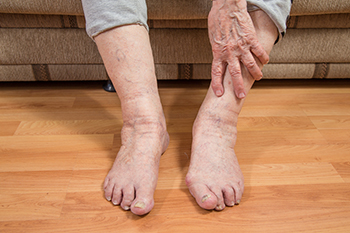
Research has shown that people who are sixty-five years and older are prone to have problems with their feet. This may be a result of wear and tear the feet endure as the aging process occurs. Many people do not pay attention to their feet until an uncomfortable foot condition arises. Additionally, they may lose their motivation to exercise, and this can contribute to specific foot problems. The arches may flatten, and the padding can become thin from weight gain, and possible heart issues. It is helpful to inspect the feet on a daily basis for cuts and bruises, and the feet and overall body may feel better when proper size shoes are worn. It may be beneficial for family members or professional caregivers to help with proper foot care. If you would like more information about how to care for elderly feet, please contact a podiatrist who can provide you with qualified answers.
Proper foot care is something many older adults forget to consider. If you have any concerns about your feet and ankles, contact Dr. Douglas Mckay from New Jersey . Our doctor can provide the care you need to keep you pain-free and on your feet.
The Elderly and Their Feet
As we age we start to notice many changes in our body, but the elder population may not notice them right away. Medical conditions may prevent the elderly to take notice of their foot health right away. Poor vision is a lead contributor to not taking action for the elderly.
Common Conditions
- Neuropathy – can reduce feeling in the feet and can hide many life-threatening medical conditions.
- Reduced flexibility – prevents the ability of proper toenail trimming, and foot cleaning. If left untreated, it may lead to further medical issues.
- Foot sores – amongst the older population can be serious before they are discovered. Some of the problematic conditions they may face are:
- Gouging toenails affecting nearby toe
- Shoes that don’t fit properly
- Pressure sores
- Loss of circulation in legs & feet
- Edema & swelling of feet and ankles
Susceptible Infections
Diabetes and poor circulation can cause general loss of sensitivity over the years, turning a simple cut into a serious issue.
If you have any questions please feel free to contact one of our offices located in Caldwell, and Galloway, NJ . We offer the newest diagnostic and treatment technologies for all your foot and ankle needs.


